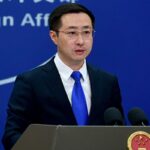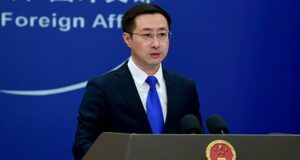
Another non-revelatory revelation that the Biden administration hid from us at the time is the Chinese government’s admission, behind closed doors, that China is behind the China-sponsored cyberattacks, at least many of them, that the U.S. has attributed to it.
Typically, after a major China-sponsored cyberattack that investigators and officials of U.S. or other governments trace to and attribute to the Chinese government, Chinese Communist Party spokesmen assert China’s opposition to cyberattacks and decry as execrable any suggestion that the Chinese government could be involved in a cyberattack and demand that everybody stop smearing China.
A few examples
In March 2024, in response to accusations that China was behind cyberhacking “that targeted US and foreign critics of China, businesses, and political officials,” Foreign Ministry spokesman Lin Jian trotted out the standard line.
China, said Lin Jian, “firmly opposes and combats all kinds of cyberattacks, and is committed to working with all countries…to strengthen cooperation and jointly deal with the threats of cybersecurity through channels such as bilateral dialogue or judicial assistance.”
Lin accused the U.S. of “encouraging” the Five Eyes intelligence network to spread “all kinds of disinformation about the threats posed by the so-called Chinese hackers…. The US is hyping up the so-called ‘Chinese cyberattacks,’ ” etc.
In August 2024, China’s embassy in Berlin disputed charges by the German government that China had been behind a 2021 cyberattack on a German government agency. The embassy dubbed the claims “anti-China political manipulation.”
In December 2024, China was annoyed to be blamed for massive cyberattacks on U.S. telecom networks entailing massive theft of data. A spokesman for China’s embassy in Washington, Liu Pengyu, complained that “the US side has been floating all sorts of disinformation about threats of ‘Chinese hackers’ to serve its own geopolitical purposes.”
Also in December 2024, China rejected “accusations it targeted US Treasury in cyberattack.” The Chinese foreign ministry spokesman, Mao Ning, declared that the Chinese government “has always opposed all forms of hacker attacks, and we are even more opposed to the spread of false information against China for political purposes.”
Ning added, apparently running out of patience, “We have stated our position many times regarding such groundless accusations that lack evidence.” (Don’t all groundless accusations lack evidence? Add failure to distinguish between restrictive and nonrestrictive constructions to Ning’s many sins.)
But also in December 2024…
Now we are learning that toward the end of the Biden administration, Chinese officials admitted “in a secret December meeting that Beijing was behind a widespread series of alarming cyberattacks on U.S. infrastructure, according to people familiar with the matter….” (The Wall Street Journal, April 10, 2025).
The people familiar with the matter, who declined to be named, say that the Chinese delegation said that “years of intrusions into computer networks at U.S. ports, water utilities, airports and other targets” is all about U.S. support for Taiwan.
“The Chinese official’s remarks at the December meeting were indirect and somewhat ambiguous, but most of the American delegation in the room interpreted it as a tacit admission and a warning to the U.S. about Taiwan, a former U.S. official familiar with the meeting said.”
The unprecedented private admission must have been sanctioned by Xi’s government, says a China expert cited by the Journal, Dakota Cary, an Atlantic Council analyst. “China wants U.S. officials to know that, yes, they do have this capability, and they are willing to use it.”
We already knew, but okay. Confirmed.











